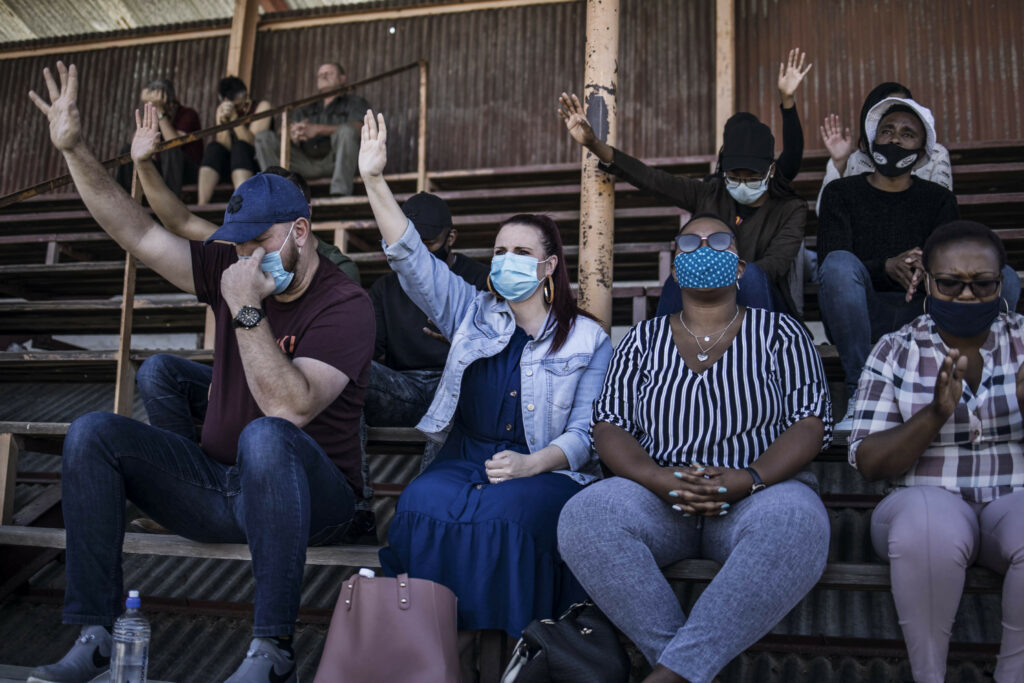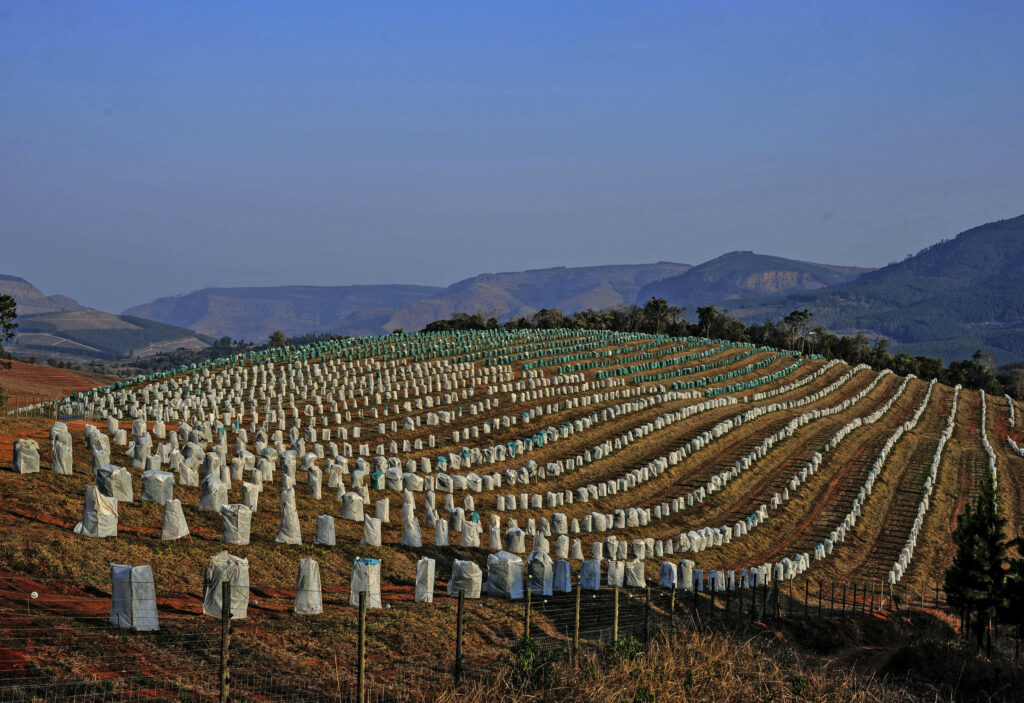Seeds of change: When Erasmus Sefoloshe started farming in Groblersdal, there was a politicised dispute over access to a canal, but his white neighbour has since loaned him money to settle his water bill. (Lucas Ledwaba)
When a group of emerging black commercial farmers defaulted on their water bill and had their taps shut off they knew they had to come up with a plan or face ruin.
One of the doors they knocked on for assistance was that of a neighbouring white commercial farmer.
“He never wasted time. He paid the bill in full, and we were back in business.”
Erasmus Sefoloshe recalls the life-saving bailout by their neighbour, who wants to remain anonymous.
Sefoloshe, a tobacco and vegetable farmer in Groblersdal, Limpopo, recalls the farmer bailed them out on two separate occasions — once when they defaulted to the tune of around R67 000 and again when they failed to pay about R40 000.
Such a gesture would not usually raise eyebrows in other societies, but in a country still battling to rid itself of the savage effects of many decades of institutionalised racism, it makes for animated interest — even more so considering it has taken place in the commercial agriculture sector, in which a white farmer in khakis and shorts is still stereotyped as a racist who would rather throw a punch than offer a handshake to a black person.
To many, especially black workers who still live on farms and work for white commercial farmers, the image of that white farmer in khakis and shorts remains a reminder of racist brutality and indifference.
While the recent protests by farmers and Economic Freedom Fighters protesters in Senekal exposed the simmering racial tensions in the country, especially in farming areas, it appears others are simply trying to carry on with normal life.
Everybody under the sun
“There is no black or white farmer. I have a problem if you talk about a black or white farmer. I don’t think we should say black farmer or white farmer, it’s all farmers,” says Anton Scholtz, a Mpumalanga-based tobacco farmer, consultant and agricultural scholar.
Scholtz, who has been farming for more than 30 years, trains and mentors farmers in the tobacco sector.
His work has taken him to other parts of Africa, including Nigeria and Uganda. He works with the Black Tobacco Farmers Association to train and mentor farmers in areas such as Limpopo, North West and Mpumalanga. Scholtz also farms tobacco in Nelspruit.
He argues that there is a future for the sector if all farmers work together, collaborate in skills transfer and support each other regardless of race.
“Everybody stands in the sun, everybody [regardless of race] has got the same challenges, theft on the farms, security problems. We have to stand together as farmers.”
Scholtz says he has observed that there is more collaboration and cooperation among older generation farmers across the races. Still, he is worried there doesn’t seem to be many young black people entering the commercial sector.
Perhaps this could be a result of another legacy of the past. A land audit published by the department of rural development and land reform in November 2017 painted a grim picture in terms of land ownership, a critical primary resource required for farming.
The audit revealed that white farmers owned 72% of the total farm and agricultural holdings by individual landowners; followed by coloureds at 15%, Indians at 5% and black people at just 4%.
The department of agriculture, rural development and land reform is rolling out a programme to release 700 000 hectares of state-owned land to black people, as announced by President Cyril Ramaphosa in February. However, the Black Farmers Association of South Africa has decried the fact that “black African people’s ownership of land is not equitable. They rely on small-scale farming of both crops and a varied range of livestock.”
 Residents take part in a special mass prayer meeting in Senekal, on October 14, 2020. – Dozens of Christian faithfuls gathered to pray for peace and unity in the small South African farming town of Senekal that is at the centre of tensions after white farmers last week stormed a courthouse during the hearing of two Black suspects accused of killing a 22-year-old farm manager. (Marco Longari/ AFP)
Residents take part in a special mass prayer meeting in Senekal, on October 14, 2020. – Dozens of Christian faithfuls gathered to pray for peace and unity in the small South African farming town of Senekal that is at the centre of tensions after white farmers last week stormed a courthouse during the hearing of two Black suspects accused of killing a 22-year-old farm manager. (Marco Longari/ AFP)
Lived experience
But the lived experience of young farmers entering the agriculture sector points to a growing culture of collaboration between established white farmers and their emerging black colleagues.
Augustine Nemasisi was apprehensive about the reception of his white neighbours when he started farming on his parents’ plot in Makhado, Limpopo, two years ago.
“Growing up, I had this imagination that farming was only for white people, and I never saw myself as a farmer. But the moment I ventured into farming and having to work with white farmers, it has given me another impression,” he says.
Unlike many young black farmers who are battling it out on tribal trust land (the land audit revealed that black people own only 1.2% of it), Nemasisi’s operation is on municipal land, where his neighbours are white, more experienced and better resourced.
Their working relationship goes beyond the usual sector and neighbourhood meetings. He doesn’t have a tractor, so his white farmer neighbour ploughs for him with his. Although he pays for this service, the terms are usually relaxed as part of a neighbourly and gentlemanly relationship.
In fact, at some point, things were not going well for him financially, and when his neighbour noticed he wasn’t ploughing when it was time to do so, he intervened by providing the service without expecting immediate payment.
“With him having to be patient with me even though things were not going well, that was an outstanding occasion for me. That said to me: ‘Hey, we are not practically neighbours, but we are like brothers because we got each other’s backs,’” Nemasisi says about his neighbour, who didn’t want to be interviewed.
That farmer simply said, “I don’t do newspapers.”
The farmers collaborate to ensure that their crops are of the same quality and share tips and effective methods of yielding a good harvest. They even refer potential clients to each other and help each other out to penetrate markets.
“I don’t see why we should have tension between us because if I don’t have cabbages and he’s got cabbages and my clients want cabbages, I don’t get hurt by referring them to him, and they get help.
“It also helps us to keep our customers in our circle, so they don’t run away and go to other places,” says Nemasisi.
Violence and crime
With the constant threat of crime in rural farming communities, Nemasisi’s neighbours took a resolution that he and other black farmers in the neighbourhood would not get involved in the community neighbourhood patrols. This was a precautionary measure because they don’t have the necessary tools such as blue lights, security permits and also don’t own guns, which may compromise them in the event of a violent confrontation with potential criminals. But the service they provide benefits the entire neighbourhood. “Since I started farming in this place, I’ve never had an occasion where my things or crops got stolen,” he says.
When Sefoloshe began farming in Groblersdal, there was racial tension. Some white farmers in the area denied the new crop of black farmers moving to the area as part of the land reform programme access to a communal irrigation canal that services the farms from the Olifants River.
The matter got so heated it caught the attention of political parties that protested in support of the black farmers and ended up in court. It was eventually resolved when the court ruled that the black farmers were equally entitled to use the canal, which had been built by the apartheid government.
“The whites were claiming that everything including the canal was theirs and they were trying to privatise it. But the court said nobody owns anything, it belongs to all of us,” Sefoloshe says. He says since then much has changed in terms of race relations among the farmers in the area, though he cannot vouch that everyone is happy.
“We have no problems with them [white farmers]. They share their experiences with us, especially those [farming] with tobacco and wheat. They never give us an attitude. They have taught us how to use seeds and chemicals. Sometimes someone just stops by to offer help and give advice when they notice something that is not going right,” says Sefoloshe, who is also a member of the Black Tobacco Farmers Association.
 The commercial agriculture sector has been in the spotlight over safety, security, labour and race leations. (Lucas Ledwaba/Mukurukuru Media)
The commercial agriculture sector has been in the spotlight over safety, security, labour and race leations. (Lucas Ledwaba/Mukurukuru Media)
Transcending colour
The relationship is not about only members of one race group assisting the other. It transcends those boundaries into pure business and even competition.
“White people buy veggies from us. They don’t care about the colour [of the skin]. We share the same market; if the price is right, you can supply everyone. The big thing is that you need to produce quality. It’s not only white [people] who can produce quality; we also produce better quality. We learnt discipline from them. They are very strict and follow a strict programme, and that’s where they helped us improve,” he says.
Scholtz agrees that there has been significant change in the demographics in the sector from the time he began farming three decades ago. He cites the issue of improved labour laws and says security on farms is the biggest challenge faced by all farmers.
But the biggest challenge of all is the high costs involved in farming, the rising costs of irrigation, electricity and climate challenges. These challenges, he argues, are more than enough reasons for farmers to work together. — Mukurukuru Media